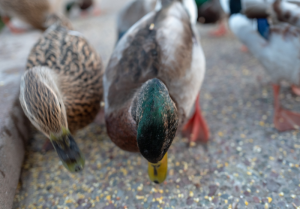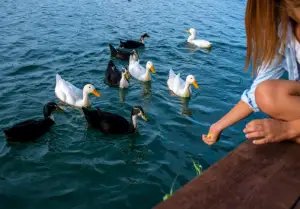Can Ducks Eat Rice?
Many of us have fond memories of going to the park to feed ducks as children. Whether you are looking to do the same with your own children or grandchildren now, or you are simply looking for treat options to give your pet ducks, it is important to know what you can and can’t safely feed your ducks.
Can ducks eat rice? Ducks love eating rice as an occasional treat, and it is perfectly safe to offer in moderation. Rice is full of fiber, vitamins, and minerals that will benefit your duck and is relatively low in calories and sugar content. As with all treats, rice should be offered in moderation, as the bulk of a duck’s nutrition should come from a commercial feed (pet ducks) or the natural diet (wild duck).
If you are thinking about providing rice as a treat to your ducks, it’s a good idea to read up on the benefits that they offer, as well as the associated concerns. Read on to learn more about the pros and cons of feeding your ducks rice, and the different varieties and types of rice and rice products that you can offer.
Health Benefits Of Ducks Eating Rice
Rice is a staple in the diets of many cultures due to its neutral taste, the myriad of health benefits, and its complementary contribution to a variety of main dishes. Rice need not be limited to human diets, though, as the nutrients that rice offers can benefit animals and humans alike.
Rice has been shown to be a good source of vitamins A and C, iron, phosphorus, zinc, fiber, and protein. Below you will find a breakdown of how these nutrients benefit a duck’s health and bodily functions.
- Vitamin A: Not only is Vitamin A important for proper bone development, but it also plays a vital role in supporting eyesight. A duck’s vision is one of its greatest assets, and ducks are known to be able to see 2-3 times farther than humans. Vitamin A helps protect one of the duck’s greatest senses.
- Vitamin C: Vitamin C is an important player in the immune system and acts as a powerful antioxidant. It also plays a role in maintaining healthy skin and bones.
- Iron: Most of us know that iron contributes to the production of red blood cells, but there are other contributions that iron makes in the body – including the regulation of body temperature, immune system function, and the digestive process.
- Phosphorus: Rice can provide a boost of phosphorus to ducks, which helps to support healthy bones and strong feathers.
- Zinc: Zinc is a mineral that aids both the immune system and the metabolic functions in our bodies. Zinc is also known to improve our senses, including our sense of taste and smell.
- Fiber: Rice has a significant amount of fiber, and ducks (like us) need fiber for proper growth and gut health.
- Protein: Protein is essential in ducks for both proper growth and egg production. Protein deficiency can lead to smaller, weaker ducks and a lack of ovulation.
Which Variety Of Rice Is Most Nutritious For Ducks?
There are over 7,000 varieties of rice found in the world, but most of us will find only a few of these available on the grocery store shelves. Which widely-available variety is most nutritious for our ducks?
Feeding Ducks Brown Rice vs. White Rice 
White rice and brown rice are not different varieties; they are simply processed differently. When harvested, rice grains are covered with a husk, under which is found the endosperm, bran, and germ.
The harvest then undergoes the process of having the husks (also known as hulls) removed before being packaged and sold. Brown rice is considered a whole grain and still has the endosperm, bran, and germ intact.
White rice will go through an additional process before being packaged. During the processing of white rice, the bran and germ are removed from the grain. This additional milling process makes white rice a “refined grain” as opposed to whole grain.
Through media and advertisements alone, most of us understand that whole grains are more nutritious than refined grains. This is true – most of the nutrients that rice contains will be held within the germ and the bran, which is removed when white rice is processed. White rice contains the same nutrients as brown rice but in smaller quantities. For the biggest nutritional impact, you will want to select brown rice over white rice.
Can Ducks Eat Wild Rice?
Anything with the term “wild” in its name must mean that it is better for you, right? While this might seem intuitively true, the answer is not black and white. In fact, “wild rice” isn’t actually rice at all. What we know as wild rice is more accurately a species of grass. In this sense, it isn’t exactly fair to compare wild rice with brown rice – but we’ll do it anyway.
Wild rice is lower in calories than brown rice and has about 40% more protein. Wild rice also contains more potassium, zinc, and fiber than brown rice. Alternatively, brown rice has six times more manganese than brown rice. Both brown rice and wild rice are rich in antioxidants and arguably more nutrient-dense than white rice.
So which among the two is better for ducks? That’s like comparing apples and oranges (although this may not be an appropriate comparison – when speaking of fruit, apples are better snack options for ducks than oranges). Both wild rice and brown rice are good for your duck in moderation, and to get the greatest benefit, you may decide to switch between the two when providing a healthy treat.
Rice Should Be Given To Ducks In Moderation
As with all foods considered treats, rice should be given to ducks in moderation. While there are numerous health benefits to consuming rice, a duck’s main source of vitamins and minerals should come from a waterfowl-specific commercial feed (for pet ducks) or their natural environment (for wild ducks).
Both of these diets offer all of the nutrients that a duck needs without the additional calories and sugar that can cause obesity and other health problems. If a duck fills up on rice, she will under-eat from her main source of nutrition, and this can cause an imbalance.
Can Giving Rice To Ducks Cause Them To Explode?
Perhaps you have heard the urban legend that a bird’s stomach will burst if it eats rice. The theory behind this is that the rice will expand once it is in the bird’s stomach, and if enough is ingested, the stomach will explode, and the bird will die. This is not true – rice must be cooked in order to expand. You can safely give a bird significant amounts of cooked or uncooked rice without the fear of a bursting stomach.
In fact, Professor Jim Krupa of the University of Kentucky performed an experiment with his 600 biology students in 2002. After discovering by a show of hands that a large percentage of students believed this myth to be true, he performed several experiments surrounding the expansion of rice in the lab.
The only rice that showed the possibility of expanding under similar conditions to a bird’s stomach was instant rice. Confident at this point that rice in no form will harm birds, he fed his own 60 pigeons nothing but instant rice and water for a full day. The only adverse effect was that they developed a taste for rice after that.
How Not To Feed Rice To Ducks 
In today’s age, with our increased awareness of gluten and dairy sensitivities, there are seemingly endless varieties of rice and rice products available. While these products have benefitted the large population of people with food allergies and sensitivities, it is prudent to stick with simplicity when it comes to feeding ducks.
The best way to feed rice to ducks is by either giving them (plain) uncooked or cooked rice. While cooked rice is easier for them to digest, uncooked rice will offer slightly higher vitamin and mineral content. Feel free to try both to find out which method your ducks prefer.
As for rice products – including rice cakes, fried rice, food made with rice flour or rice milk, and rice cereals – leave these in the pantry for human consumption. Many of these products include additives, including sugar and other flavorings, that are at best empty calories for your ducks.
Rice Is Fine, And Even Beneficial For Ducks, In Moderation
Understanding that rice should not substitute a duck’s main source of nutrition, we know that it is a safe and healthy treat to provide in moderation. What does “moderation” mean in this situation? There are multiple factors to consider here, so it is best left up to the individual. However, a good rule of thumb is that you should feed rice – or any other specific treat – to your ducks no more than once or twice weekly.

